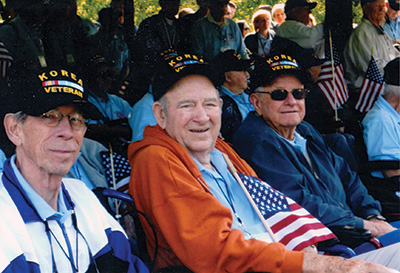Korean War vets ‘not forgotten’ with Honor Flight to Washington

Three Highland Lakes residents — John Whatley (left), Gene Fuchs and Curtis Cornell — were among the first to take an Honor Flight trip for Korean War veterans to Washington on May 1-2. Honor Flight has been working to ensure all World War II veterans get a trip to the national capital to visit the World War II Memorial. The recent ‘Not Forgotten Honor Flight’ provided the trip for Korean War veterans to visit the Korean War Memorial and other sites. Go to www.honorflight.org for more information on Honor Flight and upcoming events. Courtesy photo
DANIEL CLIFTON • PICAYUNE EDITOR
MARBLE FALLS — For almost 65 years since its start, the Korean War was often referred to as “the Forgotten War” since many Americans simply overlooked the conflict. On May 1, that all changed for three Highland Lakes veterans and about 60 other Korean War veterans.
As Gene Fuchs gathered all his paperwork at one end of the Austin-Bergstrom International Airport and began making his way back to the other to catch the flight to Washington, D.C., throngs of people stood up and clapped for him and the other Korean War veterans.
“They said, ‘Thank you for your service’ and ‘You are not forgotten,’” Fuchs said. The same applause erupted when he and fellow Highland Lakes residents Curtis Cornell and John Whatley, as well as the other Korean War veterans, arrived in the Washington airport later that day.
“It was really incredible,” Cornell said of the reception.
The three men were among the first group of Korean War veterans flown to the nation’s capital to visit the Korean War Memorial and other memorials as part of Honor Flight. This one was christened “The Not Forgotten Honor Flight.”
“For all these years, the Korean War has been called ‘the Forgotten War,’” Fuchs said.
The Korean War started June 25, 1950, when the North Korean People’s Army armed with Soviet Union tanks, heavy artillery, aircraft and other equipment invaded South Korea. After World War II, the then-Soviet Union set up the People’s Democratic Republic of Korea in North Korea in reaction to the United States and its allies calling for free elections across the entire Korean peninsula after the defeat of the Japanese. At the time, the Soviets occupied Korea north of the 38th parallel with the U.S. and other allies set below the 38th parallel. After the young United Nations ordered free elections in 1947 across Korea, the Soviet Union refused to recognize the order, thus setting up the North Korean government. Before the Soviets left North Korea in 1949, they trained the country’s military as well as supplying it with equipment.
In contrast, the United States trained a small national force in South Korea suitable for internal security before departing the peninsula in 1949.
When North Korea invaded, they did it with a better trained and armed force.
President Harry Truman ordered U.S forces in the region into South Korea a few days after the initial invasion.
A few months later, China entered the conflict, supporting North Korea.
The war waged for several years — often at what appeared a stalemate — before both sides agreed to an armistice in July 1953. Both sides still stare at each other to this day across the Demilitarized Zone at the 38th parallel.
More than 36,000 American service members died in the Korean War.
While both Cornell and Fuchs had visited the Korean War Memorial before, making the trip with a planeload of other Korean War veterans made this one even more special.
Along with providing the tour, Honor Flight assigned a Guardian to each of the veterans. The Guardian pushed the veteran around in his wheelchair (each veteran gets a wheelchair whether he or she needs it or not.)
Cornell laughed when he considered who his Guardian was, a colonel assigned to the Pentagon.
“That was something,” he said. “I told him, ‘Here is a colonel pushing a sergeant around.’”
Along with the Korean War Memorial, the group visited the World War II Memorial and several other sites.
For the three Highland Lakes veterans — who are also longtime friends — it was a chance to get the recognition they might have missed for the years and decades after the Korean War.
“I think that was one of the best parts — all the people applauding us and saying, ‘thank you,’” Cornell said.
“Everywhere we went we had a police escort,” Fuchs said. “We were treated better than the president.”
He recalled the three tour buses of Korean War veterans — with police escorting them — would just run through red lights as they traveled around Washington.
“The whole trip was really special,” he said.
Fuchs and Cornell, who have known each other since fifth grade in Thrall, highly recommend the trip to other Korean War veterans. Honor Flight began as a project to try and get every living World War II veteran to Washington to visit the World War II Memorial. Honor Flight has begun to open flights for Korean War veterans as well as Vietnam veterans, but the priority remains WWII veterans.
The next Honor Flight out of Austin is May 15-16 for Vietnam veterans and June 5-6 — called the Purple Heart Honor Flight — for Purple Heart recipients from World War II, the Korean War and the Vietnam War.
On the way home May 2, Korean War veterans found a surprise: mail call. Students from various schools, including the school where Cornell’s daughter is the principal, penned letters to the veterans thanking them for their service and assuring them they have not been forgotten.
Go www.honorflightaustin.org to learn more about Honor Flight.
daniel@thepicayune.com

